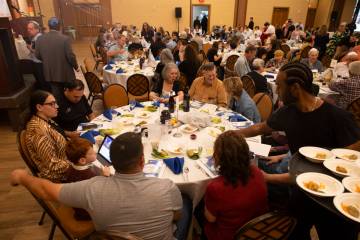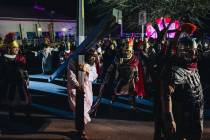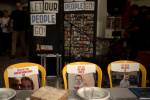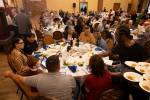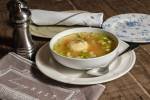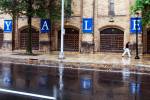Jewish families preparing homes for Passover
When the first night of Passover, or Pesach, arrives April 22 Jewish families will gather to celebrate the Exodus of the Jews from their captivity in Egypt 3,328 years ago.
The eight-day celebration’s highlight is the symbolic Seder dinner, but preparations begin days or weeks before with a bout of spring cleaning.
Desert Torah Academy instructor Binie Rivkin is expecting her second child April 28, but she said even with the impending birth she’s committed to observing the holiday. To make sure everything goes smoothly she started cleaning early this year.
As the daughter of Rabbi Shea and Dina Harlig, directors of Chabad of Southern Nevada, and wife of Rabbi Yosef Rivkin of the Chabad of Red Rock, Binie Rivkin takes the preparations seriously. She said even though it’s a lot of work, it’s worth it.
“In my opinion, absolutely it’s worth it,” she said. “And I’m not just saying that to say the right answer. I honestly mean it. It’s probably my favorite holiday of the entire year.”
Rivkin’s cleaning isn’t just about things being organized and tidy. The purpose is to rid her home of chametz, which is any leavened product containing wheat, barley, oats, rye or spelt.
In Exodus 13:3-7 the faithful are instructed that for seven days nothing leavened may be in their possession. Jews today still observe the practice in honor of the Exodus that was so swift they couldn’t wait for their bread to rise.
So starting early, observant Jews work to find every last bit of chametz in their homes and toss it, burn it or sell it before Passover.
The cleaning isn’t confined to the kitchen, Rivkin explained that bathrooms, bedrooms and every square inch of the house is “literally cleaned from top to bottom.” She vacuums every corner, washes every window, soaks all her child’s toys and more.
“Computers, you’re shaking out the keyboards, or laptops you’re turning them over and cleaning what you can,” she said. “A lot of it is spring cleaning, but it’s more than spring cleaning.”
Rivkin goes through all the soaps, lotions and detergents. She pointed out that many baby shampoos contain oatmeal.
“I’m allergic to gluten, so I already know how to check ingredients,” she said, “but I’m still checking is Tide allowed, is Downy allowed and going through everything.”
Inside the kitchen, where stray crumbs are most common, cleaning isn’t enough. Every surface that may come into contact with food — from cooktop and oven interior to the inside of the fridge — is covered in butcher paper or foil.
“It does look like the space shuttle,” Rivkin said.
The sink is fitted with a tub to keep dishes from coming into contact with everyday surfaces. As for those dishes, most keep a second set set aside specifically for Passover or they use plastic.
Rivkin said she knows of some people who have a whole second kitchen they use only for Passover.
“I don’t,” she said. “My mother doesn’t, but my mother-in-law does. It just depends on where you grew up and what type of house you have.”
Traditionally, chametz was burned or sold through a rabbi to a non-Jew. Now many of these sales take place without the items leaving the home. Rivkin said people seal up all the items that aren’t allowed during Passover, either locked in a cupboard or in storage tubs. The items stay in place, but are sold through a rabbi and then bought back after the holiday’s sundown conclusion.
“As soon as Passover is over, we don’t run and rip everything open,” Rivkin said. “We usually wait an hour or so.”
Even with every crumb gone, Rivkin said a burning of chametz is still observed. Traditionally, the day before they’ll hide 10 pieces of bread throughout the house being careful to document where they were left. In many homes the children are brought in to do the hiding. Then the father lights a candle and goes in search of the chametz using a feather to brush it into a spoon. It’s then transferred to a bag to await burning in the morning.
At the Desert Torah Academy and its Torah Tots Preschool, children prepare for Passover by helping to clean the classrooms. Then they learn about the traditions and participate in a practice Seder dinner. At the practice hosted Wednesday, assistant director Yocheved Shapiro led a group of preschoolers through the process acting out the steps to a successful Passover.
“Vacuum, vacuum, get out your spray bottles, spray the windows,” she said. “Oh, my house is so shiny and clean. And now it’s the night before Pesach, and all over the place we are going to search for our chametz. Turn out the lights. Take out a candle, and a feather, and a spoon. Search, search high and low, and find every piece of chametz. Who can show me 10 fingers. We have to take our spoon and our feather and sweep it up. No more crumbs in my house. No more chametz. I got it all. I put all the chametz in the bag. I close it up. And I put it aside until the morning. And in the morning we’re going to do something that only a mom and a dad can do. We’re going to make a fire to burn our chametz. Who makes the fire? Mommies and daddies.”
Desert Torah Academy and Torah Tots Preschool director Dina Harlig said preparation is key to helping children love and not dread Passover.
“It depends on your attitude and how you express it,” she said. “It’s part of who we are.”
She said it’s important to involve the kids, provide a lot of explanation and express excitement.
Rabbi Shea Harlig said Passover has always been one of his favorite holidays, and he thinks that’s the case for many.
“It’s nice that you’re able to get together with family, he said. “Most adults if you were going to ask them what they remember generally they would tell you they remember the family get-together at Passover, having the parents and grandparents.”
The holiday typically coincides with spring break from school. So children who are away at school travel home. Family far away gathers. While on the first two and the last two days work is restricted, the four days in the middle are frequently used to take family trips.
Rabbi Harlig said the holiday is also important because it’s a defining moment in Jewish history.
“God chose us and took us out of Egypt,” he said. “It was a miracle that we were able to get out. Normally they were blocked in. And there was nowhere for them to go.”
He added that even thousands of years later, the Passover should have meaning to all today.
“The Exodus of Egypt is a story that happened back then, but there’s a message to all of us,” he said. “That’s when we became a people, so we celebrate that. But the Exodus of Egypt is also an exodus of our own personal Egypt.”

















